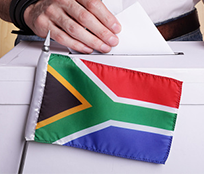South Africa will hold its seventh democratic general election on 29 May, with this year’s vote set to be the most closely contested. However, several opinion polls point to the African National Congress (ANC) losing it parliamentary majority after 30 years. Despite declining support for the ANC, we see low risk in terms of political stability and do not expect major changes in economic policies after the election.
Background
Elections in South Africa are held every five years, with national and provincial elections held simultaneously. The electoral system is one of proportional representation and requires a coalition if no party wins more than 50% of the parliamentary seats.
Support for the ruling ANC party has diminished from a peak in 2004 of 70% to 57% at the 2019 election amid various ongoing issues including corruption, high unemployment and loadshedding. Since the last election a further decline in ANC support has been evidenced by various opinion polls with a low-water mark of 37%1 reached in April this year. In the meantime, opposition parties such as the Democratic Alliance (DA) and Economic Freedom Fighters (EFF) have been gaining popularity. This, alongside the increase in support of the MK party formed by former President Jacob Zuma adds further uncertainty to the election outcome.
Potential election outcomes include another outright ANC majority, various coalition options based on how much support ANC will need from other parties or potentially another election should a coalition agreement fail to be reached.
Our View
The probability of political instability is low under the following potential outcomes:
- ANC remains in power due to fragmented opposition and a relatively stable voter base.
DA is the largest opposition party with a fifth of the votes but struggles to diversify its support base, particularly among black South Africans. The recent migration trend of skilled workers moving from Gauteng to the Western Cape could strengthen its majority in the latter, but won’t help nationwide.
The recently released IPSOS poll shows that the rise of the MK party (8.4%) is eating into support for the leftist EFF (11.5% vs 19.6% in February) as it offers competing versions of anti-white populism, which puts off most South Africans. Without palatable alternatives, many voters may just abstain if they are not voting for the ANC.
- Coalition scenarios improve, which reduces tail risk.
The decline in ANC support has started to show signs of stabilising ahead of the national elections, which reduces the probability of tail-risk scenarios, i.e., a coalition with either the EFF or MK. The latest IPSOS poll confirmed little change to ANC support (40.2% vs 40.5% the February release), and more importantly, shows that the rise of the MK party is mainly eating into support for EFF rather than at the expense of the ANC. More recent polls incorporating higher turnout scenarios suggest support for the ANC in the range of 43%-46%.
With an increased likelihood of ANC partnering with smaller parties, such a coalition should be positive as it allows policy continuity while diluting the dominance of a one-party government.
- South Africa has very strong institutions and a robust election process which makes it difficult to challenge election results. As a result, there is a low chance of any post-election issues/protests.
We do not expect major changes in economic policies after the election.
With ANC likely to remain in power, structural reforms and consolidation of state-owned companies should continue. Key areas to monitor include continued reforms at Eskom and progress in attracting private investment in the rail network.
The current trajectory of fiscal consolidation should continue, although we could see some potential slippage on social grants under certain coalition scenarios. Details of a new binding fiscal anchor as set out in the 2024 South Africa budget is still pending release.
With respect to monetary policy, we have one more inflation print to come before the South African Reserve Bank’s (SARB) next rate-setting meeting on 30 May (one day after the general election). With recent inflation prints remaining within the top half of the SARB’s 3%-6% annual inflation target and uncertainties around election outcomes, SARB is likely to remain cautious and keep policy rates unchanged again in May.
As we see low probability of political instability and do not expect major changes in economic policies post-election, with long end yields trading above 12%, real yields currently remain high, and the yield curve is still steep in an EM context. Given this backdrop, we view local bonds as remaining attractive, and we continue to hold unhedged local government bonds positions in global portfolios.
ENDNOTES
1. According to a release from Social Research Foundation (SRF)



